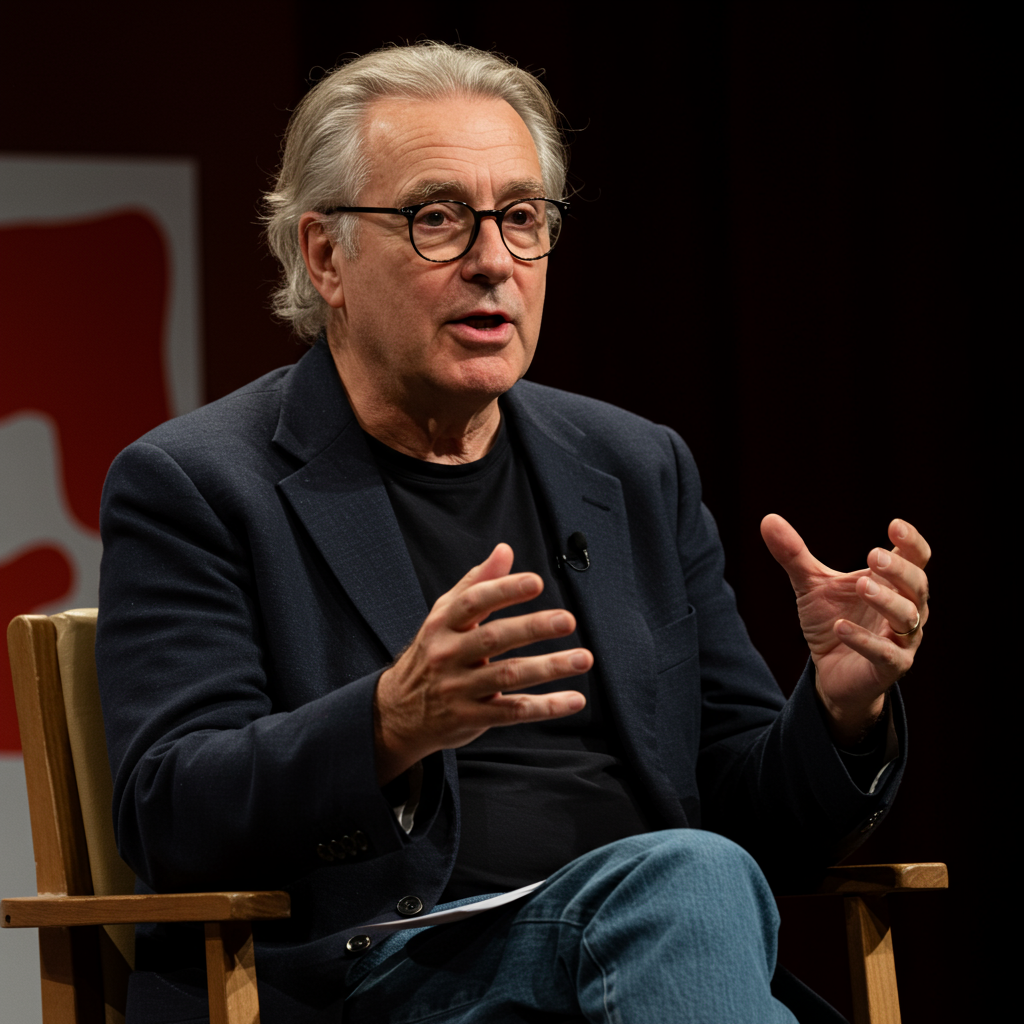Veteran filmmaker terry Gilliam recently offered candid insights into his storied career. Speaking from the Umbria Film Festival in Italy, where he serves as honorary president, Gilliam discussed the enduring relevance of his dystopian masterpiece brazil at its 40th anniversary. He also addressed his often-challenging relationship with Hollywood. Perhaps most surprisingly, he revealed how former President Donald Trump significantly impacted his planned next film, The Carnival at the End of Days.
Brazil Turns 40: A Timely Dystopian Vision
Forty years after its initial release, Terry Gilliam’s Brazil continues to resonate powerfully with audiences. The film’s depiction of an overly bureaucratic, stifling society feels remarkably prescient today. Asked about Brazil‘s surprising timeliness, Gilliam offered a typically blunt and humorous response. “Clearly, I’m a prophet,” he joked, before reflecting more seriously. He suggested that the world has always contained the elements depicted in the film. Perhaps, he mused, he was simply more attuned to looking long-term than most people. The film remains a touchstone for discussions about societal control and individual freedom.
Gilliam’s Prophetic Insight
Gilliam’s vision in Brazil captured anxieties about complex systems. The movie portrays a future overwhelmed by paperwork and inefficiency. Its themes of fighting against the system feel as relevant now as ever before. The film’s anniversary is being celebrated globally. Notably, the Umbria Film Festival is hosting a special event. Titled “Becoming X into the Gilliamverse,” it features artistic tributes to Brazil. This highlights the film’s lasting cultural impact four decades on.
Navigating Hollywood: Hits, Struggles, and ‘Munchausen’
Terry Gilliam’s path through the Hollywood system has been anything but smooth. He described his relationship with the industry as “quite fine,” albeit marked by significant battles. His introduction came with Time Bandits. Every studio initially rejected this film. Yet, upon release, it soared to number one for five weeks. This surprising success positioned Gilliam as a sought-after director.
The ‘Brazil’ Beginning
With Hollywood beckoning, Gilliam chose to pursue a personal project: Brazil. This decision, rather than taking a large studio assignment, set the tone for future encounters. Brazil‘s difficult production and release, particularly the clash with Universal boss Sid Sheinberg over the final cut, became legendary. It defined Gilliam’s reputation as an uncompromising artist.
The ‘Munchausen’ Ordeal
The struggles continued with The Adventures of Baron Munchausen. Gilliam candidly recounted the chaotic production. He attributed much of the difficulty to studio politics. The film’s original champion, David Puttnam, was fired from Columbia Pictures shortly after shooting began. New studio leadership seemed intent on undermining previous projects. Gilliam was pressured to cut the film to meet a two-hour runtime. Despite complying, the studio released it on a minimal number of prints. This effectively buried the film, according to Gilliam. He recently rewatched the 4K version and felt it was a “fucking great film.” He saw it as funny and wonderful, lamenting how few people had the chance to see it due to its release.
The State of Humor and Satire: Impact of Trump
Humor, sarcasm, and caricature are hallmarks of Gilliam’s work. However, he expressed concern about the state of satire and irony in recent years. He believes the return of Donald Trump has profoundly altered this landscape. Trump, in Gilliam’s view, has “turned the world upside down.” He suggested this political climate might make people less frightened to laugh. This contrasts with what Gilliam described as a period where “woke activists” with a “very narrow, self-righteous point of view” made people timid about making jokes. They feared being accused of “punching down.”
Irony Under Threat
Gilliam argued that this climate led to satire and irony being “basically dead.” He views humor as fundamentally essential to life. He even proposed it as a “seventh sense,” vital for navigating existence without misery.
Humor as the Seventh Sense
This belief underscores Gilliam’s approach to filmmaking. Even in dark and disturbing narratives, like Brazil or Tideland, he incorporates humor. It serves as the “spoonful of sugar,” a concept he attributes to his inspiration from Mary Poppins. This makes difficult themes more palatable and reflects his view that humor is necessary to process complex realities.
‘The Carnival at the End of Days’: A Film Derailed
Gilliam’s plans for his next feature film, titled The Carnival at the End of Days, have been significantly disrupted. He directly attributes this disruption to Donald Trump. Gilliam explained that the film was conceived as a satire reflecting the state of the world over the last few years. Trump’s actions and political style, however, “turned it upside down,” effectively killing the specific satirical angle Gilliam intended. He feels Trump has made reality stranger than satire can capture.
Trump’s Unforeseen Influence
The director revealed he had initially planned a subtitle for the film: “Great fun for all of those who enjoy taking offense.” This highlights the provocative nature he aimed for. He even considered adding a preamble to the finished film. It would place the story during “the Trump lost years from 2020 to 2024.” The political climate, in his view, has made the original script’s satirical targets obsolete or impossible to lampoon effectively.
A Star-Studded (Yet Uncertain) Future
Despite the creative challenge posed by Trump, Gilliam hasn’t abandoned the project entirely. He recognizes the need to “rewrite a lot of it.” He is still deciding on the best approach to reshape the story. The film boasts an impressive cast lineup, assuming it gets made. Jeff Bridges is slated to voice God, while Johnny Depp is attached to play Satan. Other notable names include Adam Driver, Jason Momoa, Asa Butterfield, Emma Laird, and Tom Waits. Gilliam noted that despite such a star-studded roster, securing the necessary funding remains a challenge.
Mentorship and Influences: From Tarantino to Fellini
Terry Gilliam is himself a source of inspiration for many creatives. He shared an anecdote about advising Quentin Tarantino early in his career. Gilliam attended a Sundance festival workshop where experienced directors offered guidance to newer talent. He, Volker Schlöndorff, and Stanley Donen reviewed Tarantino’s script for Reservoir Dogs. Gilliam was “blown away” by it. He found it “wonderful and extraordinary,” unlike the other directors present.
Passing On Directing Wisdom
Gilliam’s advice to Tarantino was practical and insightful: “Be very clear about what you’re trying to do. Then you surround yourself with really good people, and then you listen to them.” This interaction led to Tarantino including a thank you to Gilliam in Reservoir Dogs.
The Pantheon of Cinematic Gods
When asked about his own inspirations, Gilliam pointed primarily to filmmakers who are no longer living. He described Federico Fellini and Stanley Kubrick as “gods.” Akira Kurosawa, Luis Buñuel, and Ingmar Bergman were also among his major influences. He admired how these directors constantly surprised him. They made him think about things in fresh and different ways. That quality of surprising the audience and offering a new perspective is something Gilliam strives for in his own work.
The ‘Mary Poppins’ Principle
Beyond cinematic masters, Gilliam cited an unexpected inspiration: Mary Poppins (the character). He values her method of using a “spoonful of sugar” to help difficult “medicine” go down. This principle informs his choice to infuse dark films like Brazil with humor. It’s a deliberate tool to make disturbing themes more digestible.
The Umbria Film Festival: A Familial Affair
Terry Gilliam’s connection to the Umbria Film Festival is deeply personal. He bought a house in the region of Umbria, Italy, in 1990. His film The Adventures of Baron Munchausen was shown at the festival before he became honorary president. He developed a strong affection for the town of Montone, where the festival takes place. He also grew to appreciate the people involved and attending. This organic connection led to his increasing involvement over time.
Honourary President Role
Despite his title as honorary president, Gilliam described his role lightheartedly. He said he mainly just “turn[s] up and welcome[s] people.” He attends events, hangs around, and signs autographs. He emphasized that others do the real work of organizing the festival. The festival’s atmosphere is very “familial,” taking place in a small, beautiful town. It even serves as a yearly reunion spot for many foreigners living in the surrounding area.
The ‘Gilliamverse’ Event
This year’s festival features a special event dedicated to Gilliam’s creative world. The “Becoming X into the Gilliamverse” event involves a collective of cartoonists inspired by his work. It includes an artistic/musical intervention. A live drawing session is planned immediately following the Brazil screening. This unique tribute underscores the rich, imaginative nature of Gilliam’s films that fans affectionately call the “Gilliamverse.” Asked to describe this world himself, Gilliam demurred, stating he prefers others to define it, as he simply does what he does without overthinking it.
Championing the Overlooked: The Case for ‘Tideland’
Gilliam made a point to highlight one film he feels is often overlooked: Tideland. He stated it is one of his personal favorites among his entire filmography. Yet, it seems to “disturb a lot of people.”
Disturbing Yet Sweet
He identified the source of the discomfort. People struggle with the film’s premise of a little girl alone with the body of her recently deceased father. Despite this disturbing element, Gilliam views Tideland as “the sweetest thing” he has ever made. He sees it as a representation of a child’s vivid and often unsettling imagination. He believes people are frightened when confronted with what children’s minds are truly like, leading to the film’s polarizing reception.
Frequently Asked Questions
Why does Terry Gilliam feel Brazil is still timely today?
Terry Gilliam believes the themes in his 1985 film Brazil remain relevant because the world has always contained elements of its bureaucratic, dystopian vision. He joked that he must be a prophet, but seriously suggested that most people don’t think about long-term societal trends. The film’s depiction of overwhelming systems and inefficiency continues to resonate with contemporary audiences facing similar issues globally.
How did Donald Trump impact Terry Gilliam’s planned new film?
Terry Gilliam stated that Donald Trump “fucked up” his planned new film, The Carnival at the End of Days. The movie was conceived as a satire of recent years. Gilliam feels that Trump’s actions and political style have turned reality upside down, making it impossible to satirize effectively in the way he originally intended. This requires him to significantly rewrite the script.
What key topics were discussed in Terry Gilliam’s recent interview?
In his recent interview, Terry Gilliam discussed the 40th anniversary of his film Brazil and its surprising timeliness. He talked about his complex relationship with Hollywood, including the struggles with Brazil and The Adventures of Baron Munchausen. Gilliam also shared his views on the state of humor and satire, attributing significant changes to Donald Trump, who also impacted his next film, The Carnival at the End of Days. Other topics included his mentorship of Quentin Tarantino, his major cinematic inspirations, his role at the Umbria Film Festival, and his appreciation for his often-overlooked film Tideland.
Conclusion
Terry Gilliam remains a singular voice in cinema, reflecting on a career marked by both visionary triumphs and frustrating battles. His insights into Brazil‘s enduring timeliness underscore his unique perspective on society. His frank assessment of Hollywood highlights the perennial conflict between artistic vision and studio demands. The surprising revelation about Donald Trump’s impact on his upcoming film speaks to the volatile nature of contemporary reality and its challenge to traditional satire. As he continues to navigate filmmaking, Gilliam maintains a passionate, often humorous, outlook, always seeking to surprise audiences and offer a fresh look at the world, even in its darkest corners. His enduring connection to events like the Umbria Film Festival and his defense of misunderstood works like Tideland confirm his dedication to his craft and his distinct “Gilliamverse.”
Word Count Check: 1190 words


